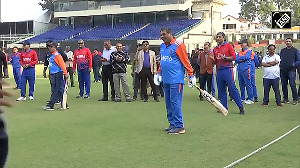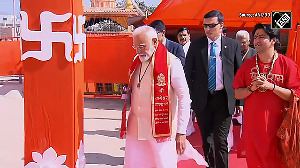US district Judge Sim Lake said lawyers can make public the names of individuals on the government's list who have been charged with crimes, publicly identified as co-conspirators in other Enron cases, pleaded guilty or have been convicted at trial of Enron-related crimes.
The names that can be released numbered about half of the 114 unindicted co-conspirators in this case. These people would also include Andrew Fastow, Enron's former chief financial officer, who pleaded guilty to conspiracy in January.
However, according to the media sources, "There's a catch: those that can be revealed are the names that already were public".
Judge Lake originally accepted the list from government under seal but defence attorneys asked that it be made public.
One hundred and fourteen is an unusually long list of unindicted co-conspirators, a label which identifies people the government says helped commit the crime but who the government has so far decided not to charge in this case.
Since Houston Chronicle revealed on December 3 that the list had been filed under seal, lawyers for various ex-Enron executives have been trying to learn whether their clients are listed.
Lake ordered that the defence lawyers, who have the government's list, may make public the names of people who have already been convicted and people who have already been disclosed as co-conspirators in publicly-filed documents in Enron prosecutions.
Fifteen people have pleaded guilty to charges relating to Enron and another five have been convicted.
The Enron Task Force named about two dozen such conspirators each in the completed Nigerian barge case and the upcoming Internet division case.
The government did not make those lists public but the defence attorneys entered them into the record in those cases. Defence attorneys in the Lay case figure the previously released conspirator names comprise about half the 114.
Lake also ordered that the defence lawyers could not publicly reveal any one of the 114 who has not been convicted or named in public documents as conspirators.
The judge did say that if there is a co-conspirator on the list who has been told by the government that they are a target or has entered into an agreement with the government, then defence attorney can tell those people individually that they are on the list.
"Nothing in this order prohibits either the defendants from seeking to speak to individuals on the list...or individuals from refusing to speak to defendants."
Skilling's lawyer Daniel Petrocelli had argued that it would hinder Skilling's chances of talking to people who are unindicted co-conspirators if he could not tell them that they are named as such.
The idea is that people might have thought they were home free and might speak more readily if they knew they were named.
But lawyers in the other two cases with co-conspirator lists have complained that when people learn they are named as conspirators they refuse to help the defendants on trial.
Lay and Skilling are accused along with ex-Enron chief accounting officer Rick Causey. All three pleaded not guilty to all charges and no trial date has been set.






 © 2025
© 2025